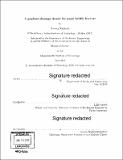A gradient-damage theory for quasi brittle fracture
Author(s)
Narayan, Sooraj.
Download1119388958-MIT.pdf (6.701Mb)
Other Contributors
Massachusetts Institute of Technology. Department of Mechanical Engineering.
Advisor
Lallit Anand.
Terms of use
Metadata
Show full item recordAbstract
Phase-field modeling of brittle fracture of linear elastic solids has been the subject of several studies in the past 25 years. An attractive feature of this approach to model fracture is its seamless ability to simulate the complicated fracture processes of nucleation, propagation, branching and merging of cracks in arbitrary geometries. While most existing models have focussed on fracture of "ideal brittle" materials, we consider fracture of "quasi-brittle" materials. The material is considered to be quasi-brittle in the sense that it does not lose its entire load-carrying capacity at the onset of damage. Instead there is a gradual degradation of the strength of the material, which is the result of microscale decohesion/damage micromechanisms. In this thesis we discuss the formulation of our gradient-damage theory for quasi-brittle fracture using the virtual-power method. The macro- and microforce balances, obtained from the virtual power approach, together with a standard free-energy imbalance law under isothermal conditions, when supplemented with a set of thermodynamically-consistent constitutive equations will provide the governing equations for our theory. We have specialized our general theory to formulate a simple continuum model for fracture of concrete - a quasi-brittle material of vast importance. We have numerically implemented our theory in a finite element program, and simulated numerical examples which show the ability of the simulation capability to reproduce the macroscopic characteristics of the failure of concrete in several technically relevant geometries reported in the literature..
Description
Thesis: S.M., Massachusetts Institute of Technology, Department of Mechanical Engineering, 2019 Cataloged from PDF version of thesis. Includes bibliographical references (pages 73-77).
Date issued
2019Department
Massachusetts Institute of Technology. Department of Mechanical EngineeringPublisher
Massachusetts Institute of Technology
Keywords
Mechanical Engineering.